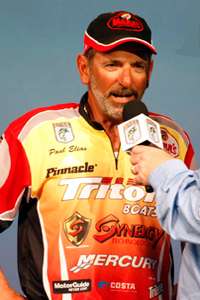
Paul Elias is one of the longest-tenured pros still active in the Elite Series. But the 59-year-old Mississippian shows no signs of slowing down. For 2011, Elias makes his return to the Bassmaster Classic after a 7-year hiatus and is as pumped as ever to hit the road. Here's how he answered our 20 Questions:
1. Where were you born and raised?
Laurel, Miss.
2. How did you get started in bass fishing?
I started at a real early age. I think by the time I was four or five years old I was fishing for bass. But when I first heard about Ray Scott starting to hold professional bass fishing tournaments, I knew that's what I wanted to do. I was in high school when I heard about it. I went and got my college education and then went offshore and worked to get enough money to buy a boat, and the whole time the only thing I had on my mind was getting a professional bass fishing career started.
3. Who were some of your earliest fishing heroes?
Bill Dance and Roland Martin were my two first fishing heroes besides my dad and a man named Charlie Reddick. My dad was crippled, and he couldn't take me fishing, so Charlie — who lived across the street — took me under his wing and took me fishing and hunting.
4. When did you realize you had made it in the bass fishing industry?
After I won the Classic in 1982. That was probably when I cemented myself in the profession.
5. What's the biggest bass you've ever caught?
Fourteen pounds, two ounces — I caught it out of Lake Eddins here in Mississippi. It's a private lake development. I think I caught it in 2006.
6. What do you love most about bass fishing?
It's hard to think of just one thing, but I think what I love most is the thrill of every bite. Second to that is the competition. I thrive on it. Plus, being able to be outdoors and making a living doing it is great.
7. Where is your favorite place to fish for bass and why?
Falcon Lake in Texas. It's where I set the (4-days, 5-fish-limit weighing 132-08) record and is also by far the best fishery in the country.
8. What has been your greatest accomplishment in the fishing industry?
I think winning the Bassmaster Classic and being able to have a 30-plus year career are pretty good.
9. What goals have you yet to accomplish in your bass fishing career?
I'd like to win Toyota Tundra Bassmaster Angler of the Year. That's about the only thing left for me. I've never had a really strong year where I had a chance at it. You have to start strong, and I've never really done that. I always seem to be playing catch-up during the year.
10. What keeps you motivated to reach that goal?
The competition. Every year I look forward to taking on the best anglers in the world.
11. What is the biggest challenge you've faced in your career?
The biggest challenge I've faced in my career is being able to maintain adequate sponsorship for the price of entry fees (laughs).
12. If you could do one thing over in your career, what would it be?
The main thing I'd do over again is that I would have spent more time with my family throughout my career.
13. What is the biggest lesson you've learned in your career?
Probably the best lesson I've learned is that no matter how your day is going, you have to remain focused and never lose confidence.
14. What is your greatest strength as a professional angler?
Open lake structure fishing.
15. What is your greatest weakness as a professional angler?
Finesse fishing.
16. Do you have any fishing superstitions?
Not anymore. I used to, though. I used to dread the number 13. It stemmed from the first time that I drew boat number 13, I zeroed. Then, within the same year, I came in 2nd place in a big tournament and I caught 13-13 and lost by 13 ounces. I developed a mental block toward the number. What was funny was that Hank Parker thought it was a sin to be superstitious. He knew how bad I hated the number 13, so he'd grab my hat and write "13" under the bill before a tournament. But I finally got over that and don't really worry about it anymore. I've drawn 13 several times since then.
17. How big a part does luck play in tournament bass fishing?
Well, it depends on how you define luck. I think it's very important. Some people would say that luck is being at the right place at the right time, so I think that luck combined with intuition — from an angler's aspect — is important to being a good professional angler. There is a luck element that has to go your way in order to win tournaments. I think you have a large part in creating that luck, but there is still some randomness involved.
18. When you're not bass fishing, how do you like to spend your time?
I like to play golf and fun fish. Of course, those are besides family time.
19. The 2011 Classic was your first Classic in seven years. How does it feel to be back?
It feels great! I've always had — for the most part — a pretty strong showing at the Classic.
20. When it's all over, how do you want the bass fishing world to remember you?
I think I want to be remembered as an innovator in the industry, and someone who had a strong love for the sport — also as a good, honest competitor.
